Are Grains the Culprit in Health and Weight? Is 'Wheat Belly' a Crackpot Diet? (UPDATED through 29 April)
A helpful reader wrote today to comment on my extreme difficulty in losing weight (fat), which I alluded to in my last double century post. After three double centuries, I am more fit, but my weight sits stubbornly at ~180 pounds (I should be at 175 by now).
My comments and experience follows below the quote.
I have followed your wind in my face blog for a few years. We are similar age (52) , the same height 5 feet 11” and have had similar experiences with training and body weight. I cycle in a hilly area, that is hot in the summer, Kelowna, BC, Canada, and belong to a masters swim club.
I noticed that you had a difficult year in 2015. I had a cycling accident in June 2015 and broke my thumb. The recovery was 6 months long. In that time I went from 191 lbs to 200 lbs ! I also had very bad IBS, Acid Reflux, Asthma, 2 bouts of pneumonia and many other issues, sleepy, taking too much alcohol and pain killers.
I now weigh 169 lbs and have zero health issues. I have lost 31 lbs in 4 months. I can also ride for hours without any on bike nutrition. My recovery after workouts is super fast. I am swimming hard 2.5 to 3k workouts 3-4 times a week and 3 -4 bike rides a week.
I read Wheat Belly by William Davis MD @AMAZON and on Dec 7th I stopped eating Wheat and all grains. I lost 20 lbs in 4 weeks. I then moved to a low carb high fat diet. Real clean food, lots of eggs, bacon, fish, meat, veg. The Paleo definition is closest to my diet. I only counted my carbs, keeping daily consumption below 100 grams of carbs and often under 70 gms. My weight dropped off so fast. My energy level has also improved immensely. I concluded that I was insulin resistant. This often increases with age, often hitting people in their 40’s and 50’s. You can see the athletes who train incredibly hard but keep gaining weight at every tri and marathon event.
I really feel that you could look into the research. Many endurance athletes no longer carbo load and instead are keto adapted. With my keto adaptation I no longer use sugar, via carbs or gels for energy. My body uses fat instead. There is an issue with glycogen depletion on intensive efforts. My swim is often high intensity interval sets. The advice there is to have up to 30 gms carbs from say a Banana after a workout or possibly during on an effort longer than 1 hour.
I was in your situation of frustration with weight and health issues. Below are some links that may help.
https://www.marksdailyapple.com/press/the-primal-blueprint-diagrams/#axzz41F4yPAkH
https://www.marksdailyapple.com/definitive-guide-to-the-primal-eating-plan/#axzz41F4yPAkHKeto Talk Podcast- episode 18 deals with high intensity effort when keto adapted.
https://itunes.apple.com/us/podcast/keto-talk-jimmy-moore-doc/id1071990583?mt=2Keto Clarity Kindle
https://www.amazon.ca/gp/product/B00MEX9B4C/ref=oh_aui_d_detailpage_o04_?ie=UTF8&psc=1Primal Endurance Podcast
https://itunes.apple.com/us/podcast/the-primal-endurance-podcast/id996260187?mt=2Art and Science of low carb performance - https://www.carbsmart.com/art-and-science-of-low-carbohydrate-performance.html
Ben Greenfield - https://greenfieldfitnesssystems.com/product/the-low-carb-athlete/
WIND: good luck with low carbs at high altitude, where the amount of oxygen is much lower, which strictly limits aerobic energy production. This can be measured on a power meter with reliably reduced output figures with each 1000 foot gain. But you don’t need to measure it to know it: just try a hard sprint for 10 seconds at 11,000'.
I am a HUGE skeptic of such claims, but the flip side is that some claims can be right (as far as they go and with some limits and in a particular context), even if the basis for the claims is inaccurate or wrong and/or sensationalized (as Wheat Belly tends to do).
Second, everyone has a different physiology, and perhaps more critical, a different gut biome. So what works for one person may not work for another, or may be downright bad. For example, the claim in Wheat Belly that whey protein spikes blood sugar is provably false for me, as measured by a glucose blood meter (see Day 4). I become very skeptical of any source that makes such absurd claims, particularly when it proves flat-out wrong (that it could be true for some people is irrelevant if the advice given is general makes that advice irresponsible IMO).
But something isn’t working for me any more: sleep quality has been an issue (causal or result of something?), extreme difficulty getting my weight down, highly variable energy. It may *all* be just sleep for all I know.
Worse, my fasting blood sugar is up from 88-92 as measured over a period of 15 years to 110-120 year-over-year (2015). I have a bad feeling that this sudden change was precipitated by the gut infection followed by the metronidazole nerve damage nightmare. My theory is that my gut biome was damaged and possibly my vagus nerve, since I had nerve damage to the ulnar nerves in my arms and to nerves in my feet (and while mostly recovered, issues linger).
See also:
- Typical American Diet Can Damage Immune System
- Science News: “A good diet for you may be bad for me”
- Science News: “Upending daily rhythm triggers fat cell growth”
- Keeping the Pounds Off + Fat Loss, Muscle Mass, Bone Density, Training, BMI, DEXA
- Dropping Body Fat After Fall/Winter Gains
- Sleep Affects Many Aspects of Physiology
- Blood exerts a powerful influence on the brain
- Fluoroquinolone Antibiotics Can Cause Peripheral Neuropathy, Ruptured Tendons, Cardiovascular Disease (and Flagyl/Metronidazole)
- Coffee: New Research Shows Huge Promise for Health Benefits for Liver, Diabetes
- Damage Your Gut Biome with Artificial Sweeteners? (make yourself more prone to diabetes)
- Fresh Food is Best: Additives to Keep Food Fresh May Disrupt the Gut Biome
- Anti-Oxidants Might be Counterproductive for Athletes
- BMI (Body Mass Index): Junk Science
Diet analysis
Be that as it may, and still having a healthy skepticism, I checked out my diet the day of this blog post, in terms of carbs. Today’s example is a lot lower in carbs than yesterday’s diet (lots of wheat and a terrible gut ache all night, perhaps a coincidence), and here’s how it looks on a day with a major caloric deficit.
I did not eat wheat today, but I did eat corn (tortillas). I have no real idea how I could realistically get my carbohydrate intake down from 290 grams to, say, 100 grams, particularly given the 1400 calorie deficit as shown. However, 75 of those grams are 300 calories of GU on the ride—and I discount that as problematic when consumed on a ride. I can remove wheat and corn, and see if that helps—it’s something concrete to try. As well, I can monitor my carbohydrate intake next to the calorie column, and at least keep it from being excessive with a goal of perhaps 200 grams of carbs given me 1000+ per day rides.
Day 1
Perfectly normal day, persistent gut ache but ride was strong.
2016-04-16 2:39 cycling workout of 1846 Kj at crank = ~1772 KCal.
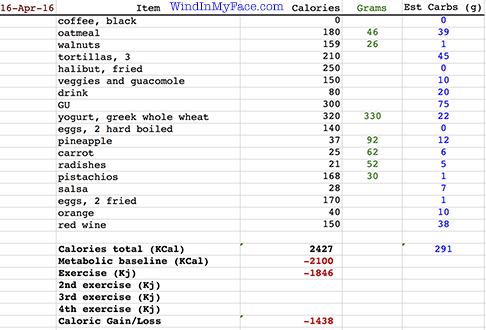
Excercise Kj is kilojoules at crankset as per SRM power meter.
Assuming 25% metabolic efficiency, metabolic expenditure is 4X larger, thus
Exercise Kj of 1846 equates to (1846 * 4 * 0.25 * 0.96) = ~1772 KCal
Day 2
Stomach feels fine in AM, but very uncomfortable bloating in mid-afternoon.
2016-04-16 2:39 cycling workout of 1846 Kj at crank = ~1772 KCal.
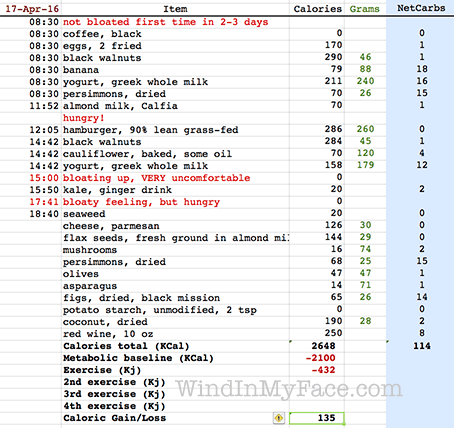
Day 3
Extreme lack of energy on bike even for 30 minute ride at 158 watts. I can do better than that with the flu! Have slept poorly for four nights however. Got a blood glucose meter to begin testing blood sugar response to food.
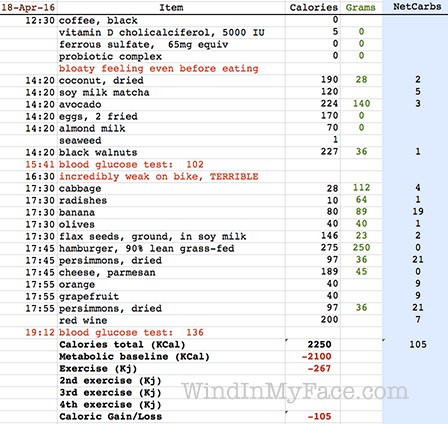
Day 4
One Touch Ultra Mini @AMAZON Blood sugar meter reads 79 in morning after ~14 fast. That is strangely low... could it be wrong? But the test an hour later also measures 79 (after the Whey) and the yogurt test clearly shows a change as would be expected.
Blood sugar meter refutes general claim in Wheat Belly @AMAZON that whey protein spikes blood sugar: 92 minutes after TWO servings of Hammer Whey (34g whey protein isolate with glutamine and Stevia), zero affect on blood sugar (79 -> 79).
Later after consuming 372g of unsweetened greek whole milk yogurt (24g carbs), blood sugar measured 102, so 25g of milk sugars affects blood sugar level. Then later, it went from 102 to 136 after a sweet potato, but note the 90 min bike ride then dropped that 136 to just 86, strongly suggesting that exercise can indeed drop blood sugar (not proof per se, since it could have dropped on its own).
I was hungry today, little different than usual, and ate most of the exercise back—my usually issue. So far, no benefits at all that I can see from eliminating grains and reducing carbs. The main thing is impaired power on the bike, as I would expect.
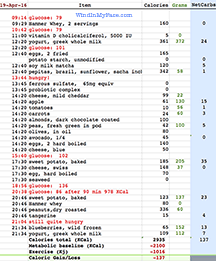
Day 5
I’m seeing no benefits from eliminating grains at all—nothing matching the wild claims in Wheat Belly—certainly zero of the outlandish positive claims.
But surely one of the negatives: today was the weakest day on the bike all year, a power level 10 watts BELOW the worst average of the three double centuries I did in March. To be fair, I’m in an energy slump, a issue I’ve had a number of times in the past year, so I’m not ready to blame the elimination of grains and reduction in carbs for that—yet.
Allergies were severe today (runny nose and violent sneezing), the first time in years—can the diet be blamed for that? It is something very odd and unusual unprecedented for many years.
So: the advice of Wheat Belly so far means at best no improvements, and at worst, severe allergic reactions versus years of no issues and severely impaired power. It’s looking like total horse shit, but I’ll hang in there for another 4-5 days (that is, no grains), and see if any of the alleged benefits emerge.
Wheat Belly makes a boatload of unfounded claims, so I am methodically and objectively testing what I can test. So, regarding the 18:00 blood glucose test below, I wanted to see if taking two GU packets (50 grams carbs) in a 45 minute period would spike blood sugar during a ride (at 00:00 and 00:45 ride duration 01:30). Immediately after the ride, blood sugar was 89, which is excellent for a 12-hour fasting level. So clearly exercise works to keep blood sugar normal (see previous days blood sugar spikes after carbs). As with yesterday’s whey protein blood glucose test disproving that ridiculous W.B. claim, this test repdudiates the “keep carbs extremely low” advice in Wheat Belly, at least for me on the bike.
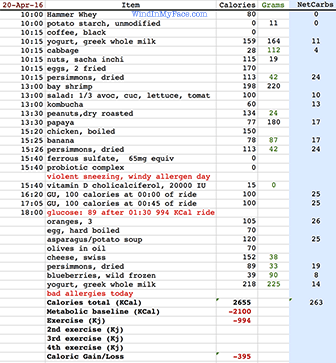
Update 29 April 2016
I've had no grains of any kind for thirteen (13) days—NONE of {wheat, rye, oatmeal, rice, etc}.
In a nutshell: this Wheat Belly diet appears to be a crackpot diet, at least for my body. Results:
- 7-10 days of being weaker than I've been in a year (to an extreme).
- The worst allergic issues I’ve had in 15 years.
- Appetite rampantly out of control on some days.
- Weight soared to within a few tenths of a pound of a five-year high.
- No improvements of any kind or even a sense of any improvement.
In short, an unmitigated disaster. Can I blame it on the diet, or is it just coincidence? Try it yourself—maybe it works for some people, particularly anyone gorging on bread or similar. But where are the benefits? I experienced nothing but Bad Stuff and not a single thing positive. Nor did I experience any of the predicted tempory discomforts, just generally bad “behavior” as per above.
Doctors pushing their own crackpot diets ought to provide some real science and be held accountable. I have no issue with reducing excessive carb intake (a good idea), but Wheat Belly leaps from good advice into a chasm of unsubstantiated snake-oil salesmanship (read the first chapter or two, no thinking person could help but be aghast at the wild claims that are made).
I’m going to eat some sushi (with rice) before tomorrow’s Devil Mountain Double, my traditional stomach-friendly fare before a double, when I can get it.
Update 17 June 2016
I’ve stayed away (mostly) from grains, the exceptions being Panda licorice during double centuries and sushi with rice before double centuries. No bread for a couple of months now. At the same time, I noticed that I had something like 6 of 10 or so symptoms of iodine deficiency. I started eating sheets of seaweed nori, kelpt tablets, and taking 25,000 IU Vitamin D.
I feel GOOD again. Weight has plummeted by 8 pounds in 3 weeks. Too many factors here to say for certain, but I think it is the iodine; my TSH has been borderline (low) for some years.









